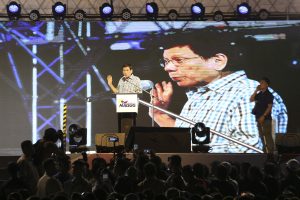Former Philippine President Rodrigo Duterte is throwing allegations at his successor, Ferdinand Marcos Jr., and even raising the prospect of removing him from office, bringing into the open a long-rumored split between the two.
In an expletive-laden speech late Sunday, the former populist leader alleged that Marcos’ legislative allies are plotting to amend the constitution to lift term limits and warned that could lead to him being ousted like his father, the late dictator Ferdinand Marcos. Duterte also accused Marcos of being a drug addict.
Marcos laughed off Duterte’s allegations in comments to reporters before flying to Vietnam for a visit. Marcos said he would not dignify the accusations with an answer, but claimed his predecessor is using fentanyl, a powerful opioid.
In 2016, Duterte said he had used fentanyl in the past to ease pain caused by injuries from a motorbike accident. His lawyer, Salvador Panelo, said Monday that Duterte stopped taking fentanyl before he became president in 2016.
“I think it’s the fentanyl,” Marcos said. “Fentanyl is the strongest pain killer that you can buy. … After five, six years, it has to affect him, that’s why I think this is what has happened.”
Members of the House of Representatives have been talking about amending the constitution, and Duterte claimed without offering any evidence that lawmakers who support Marcos, including House Speaker Martin Romualdez, are bribing local officials to amend the 1987 constitution to remove term limits so they can extend their grip on power.
Romualdez, who is the current president’s cousin, has denied that claim, saying he wants the constitution amended only to remove restrictions on foreign investment.
Marcos has said he is open to altering economic provisions of the constitution but opposes changing a provision that restricts foreign ownership of land and other critical industries like the media. Philippine presidents can serve only a single six-year term.
Opponents of opening the constitution to changes include the Senate. It issued a statement last week warning that its checks-and-balance role could be undermined if the House of Representatives proceeded with plans to pursue amendments in a joint session rather than by separate voting in the 24-member Senate and the 316-strong House.
The Commission on Elections said Monday it was indefinitely suspending all activities related to the effort to change the constitution, which requires the signed consent of about 8 million registered voters nationwide. The decision temporarily derailed moves to revise the charter.
The 1987 constitution, which is laden with safeguards to prevent dictatorships, came into force a year after Marcos’ strongman father was ousted by an army-backed “people power” uprising amid allegations of plunder and human rights atrocities during his rule.
The speech put credence into months of rumors about a political split with his successor even though Duterte’s daughter Sara is Marcos’ vice president following their landslide election victory in 2022.
In recent weeks, Duterte’s supporters have been angered by reports of an unannounced visit by International Criminal Court investigators last month who are probing widespread killings during an anti-drug crackdown Duterte launched as president. The reported visit has not been confirmed.
Duterte, who became notorious for the harsh crackdown that left thousands of mostly poor suspects dead, claimed in his speech without offering any evidence that Marcos was once on a law enforcement list of suspected drug users.
“You, the military, you know this, we have a president who’s a drug addict,” Duterte said to cheers from a few thousand supporters in his southern home region of Davao City.
The Philippine Drug Enforcement Agency said Monday that Marcos was never on such a list, contrary to Duterte’s claim.
In 2021 when he was a presidential aspirant, Marcos’ spokesperson showed two reports from a private hospital and the national police laboratory that said Marcos had tested negative for cocaine and methamphetamine.
The two men also have differences over foreign policy.
While Duterte nurtured cozy ties with Chinese President Xi Jinping and Russian leader Vladimir Putin while in office, Marcos has been seen as veering toward Washington over his country’s territorial disputes with China in the South China Sea. Early last year, Marcos allowed an expansion of the U.S. military presence in the Philippines under a 2014 defense pact.
Marcos succeeded Duterte in mid-2022 after campaigning on a promise to work for an economic turnaround after the coronavirus pandemic and bring unity to a country long saddled by crushing poverty and deeply entrenched political divisions.
Marcos led his own rally Sunday at a seaside park in Manila, which police said drew about 400,000 people after nightfall.
The rally was called to launch what Marcos says is a campaign for a “new Philippines” by reforming corrupt and inefficient governance and boosting public services. During the gathering, the president stayed nonconfrontational in the face of the escalating criticisms from Duterte’s camp.
“The ‘new Philippines’ is not just a slogan,” Marcos told cheering supporters. “To those whose overheated imagination has been poisoned by toxic politics, the ‘new Philippines’ is no Trojan horse, it conceals no agenda.”
Addressing government officials and employees, Marcos called for an end to sluggish services to the public. “Distress calls must be responded to without delay. In whatever government office, red tape must be replaced with a red carpet,” he said to applause.
































